after与in的用法区别
- 格式:doc
- 大小:90.50 KB
- 文档页数:15
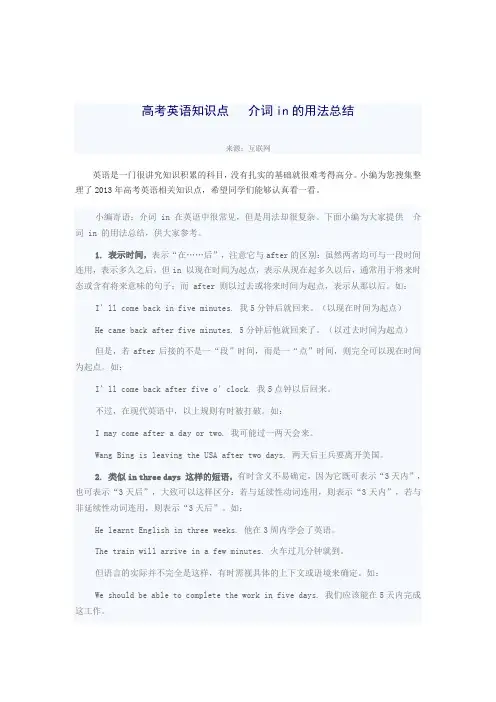
高考英语知识点介词in的用法总结来源:互联网英语是一门很讲究知识积累的科目,没有扎实的基础就很难考得高分。
小编为您搜集整理了2013年高考英语相关知识点,希望同学们能够认真看一看。
小编寄语:介词 in 在英语中很常见,但是用法却很复杂。
下面小编为大家提供介词 in 的用法总结,供大家参考。
1. 表示时间,表示“在……后”,注意它与after的区别:虽然两者均可与一段时间连用,表示多久之后,但in 以现在时间为起点,表示从现在起多久以后,通常用于将来时态或含有将来意味的句子;而 after 则以过去或将来时间为起点,表示从那以后。
如:I’ll come back in five minutes. 我5分钟后就回来。
(以现在时间为起点)He came back after five minutes. 5分钟后他就回来了。
(以过去时间为起点)但是,若after后接的不是一“段”时间,而是一“点”时间,则完全可以现在时间为起点。
如:I’ll come back after five o’clock. 我5点钟以后回来。
不过,在现代英语中,以上规则有时被打破。
如:I may come after a day or two. 我可能过一两天会来。
Wang Bing is leaving the USA after two days. 两天后王兵要离开美国。
2. 类似in three days 这样的短语,有时含义不易确定,因为它既可表示“3天内”,也可表示“3天后”,大致可以这样区分:若与延续性动词连用,则表示“3天内”,若与非延续性动词连用,则表示“3天后”。
如:He learnt English in three weeks. 他在3周内学会了英语。
The train will arrive in a few minutes. 火车过几分钟就到。
但语言的实际并不完全是这样,有时需视具体的上下文或语境来确定。
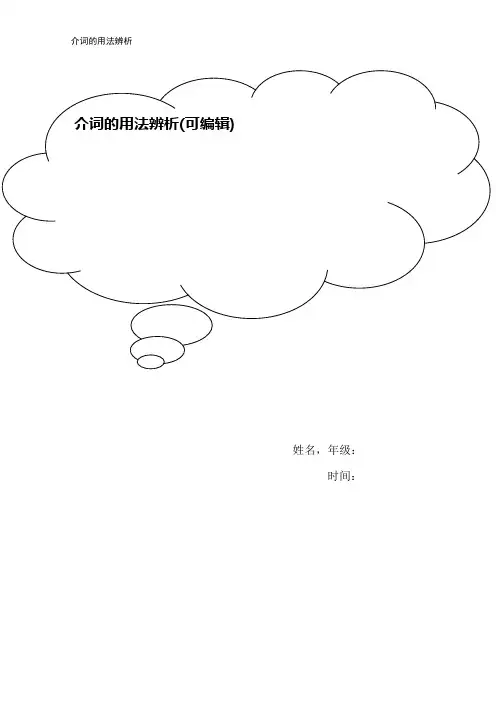
姓名,年级:时间:介词的用法辨析老师叮咛:李辉老师说,“一切的道理都比不过三个字,‘我愿意!’。
”学好英语有时其实很简单,只要你愿意去学,就会有结果。
学习介词就是这样的道理。
以下介词虽然大家都已经见过无数次,但是你是否真的学会了这些看似简单的单词呢?如果没有,你又是否愿意去学习这些呢?下面的内容就为大家讲解了介词的用法辨析。
本文经过了全网首席高考英语名师李辉老师团队高度认真的整理校对,无错、可信!可供全国各省高中生打印、学习、背诵!1.时间或地点介词in、on、at的用法区别:●表示时间时:in表示在一段时间里(在将来时句子中则表示在一段时间之后),on表示在具体的某一天或者某天的上下午等,at表示在某个时刻或者瞬间;●表示地点时:in表示在某个范围之内,on表示在某个平面上或与一个面相接触,at则表示在某个具体的场所或地点。
Eg:He was born on the morning of May 10th.(他出生于五月十日的早晨。
)I usually get up at 7:00 in the morning.(我通常在早上的七点钟起床。
)His glasses are right on his nose.(他的眼镜就架在他的鼻子上。
)He is at the cinema at the moment。
(此刻他正在电影院。
)2.after与in表示时间的用法区别:●“after+(具体时刻/从句)”表示“在…时刻之后”常用于一般时态;●“in+(一段时间)”表示“在(多久)之后”,常用于将来时态。
Eg:He said that he would be here after 6:00。
(他说他六点钟之后会来这儿。
)My father is coming back from England in about a month.(我父亲大约一个月以后从英国回来。
)3.since与for表示时间的用法区别:●“since+(具体时刻/that—从句)”表示“自从…起一直到现在”;●“for +(一段时间)”表示“总共有…之久",都常用于完成时态. Eg:Uncle Li has worked in this factory since 1970。
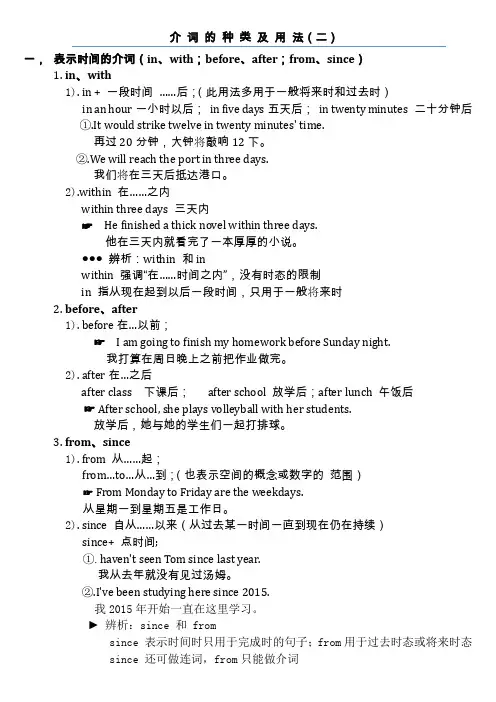
介词的种类及用法(二)一,表示时间的介词(in、with;before、after;from、since)1. in、with1). in + 一段时间……后;(此用法多用于一般将来时和过去时)in an hour一小时以后;in five days五天后;in twenty minutes 二十分钟后①.It would strike twelve in twenty minutes' time.再过20分钟,大钟将敲响12下。
②.We will reach the port in three days.我们将在三天后抵达港口。
2).within 在……之内within three days 三天内☞He finished a thick novel within three days.他在三天内就看完了一本厚厚的小说。
●●●辨析:within 和inwithin 强调“在……时间之内”,没有时态的限制in 指从现在起到以后一段时间,只用于一般将来时2. before、after1). before在…以前;☞I am going to finish my homework before Sunday night.我打算在周日晚上之前把作业做完。
2). after在…之后after class 下课后;after school 放学后;after lunch 午饭后☞After school, she plays volleyball with her students.放学后,她与她的学生们一起打排球。
3. from、since1). from 从……起;from…to…从…到;(也表示空间的概念或数字的范围)☞From Monday to Friday are the weekdays.从星期一到星期五是工作日。
2). since 自从……以来(从过去某一时间一直到现在仍在持续)since+ 点时间;①.haven't seen Tom since last year.我从去年就没有见过汤姆。
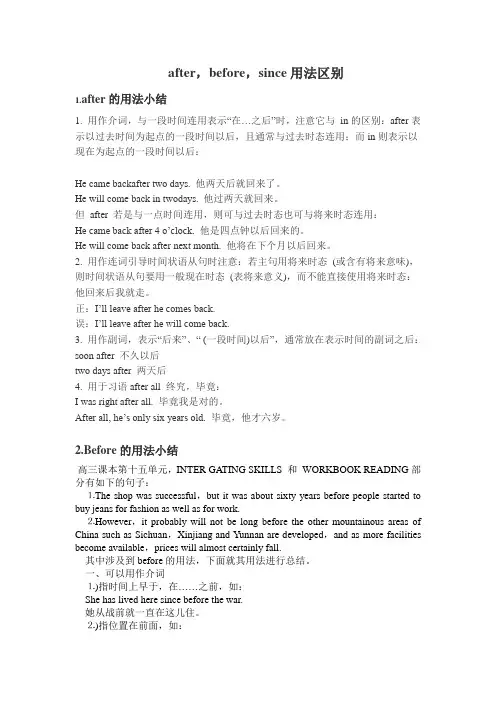
after,before,since用法区别1.after的用法小结1. 用作介词,与一段时间连用表示“在…之后”时,注意它与in的区别:after表示以过去时间为起点的一段时间以后,且通常与过去时态连用;而in则表示以现在为起点的一段时间以后:He came backafter two days. 他两天后就回来了。
He will come back in twodays. 他过两天就回来。
但after 若是与一点时间连用,则可与过去时态也可与将来时态连用:H e came back after 4 o’clock. 他是四点钟以后回来的。
He will come back after next month. 他将在下个月以后回来。
2. 用作连词引导时间状语从句时注意:若主句用将来时态(或含有将来意味),则时间状语从句要用一般现在时态(表将来意义),而不能直接使用将来时态:他回来后我就走。
正:I’ll leave after he comes back.误:I’ll leave after he will come back.3. 用作副词,表示“后来”、“ (一段时间)以后”,通常放在表示时间的副词之后:soon after 不久以后two days after 两天后4. 用于习语after all 终究,毕竟:I was right after all. 毕竟我是对的。
After all, he’s only six years old. 毕竟,他才六岁。
2.Before的用法小结高三课本第十五单元,INTER GATING SKILLS 和WORKBOOK READING部分有如下的句子:⒈The shop was successful,but it was about sixty years before people started to buy jeans for fashion as well as for work.⒉However,it probably will not be long before the other mountainous areas of China such as Sichuan,Xinjiang and Yunnan are developed,and as more facilities become available,prices will almost certainly fall.其中涉及到before的用法,下面就其用法进行总结。
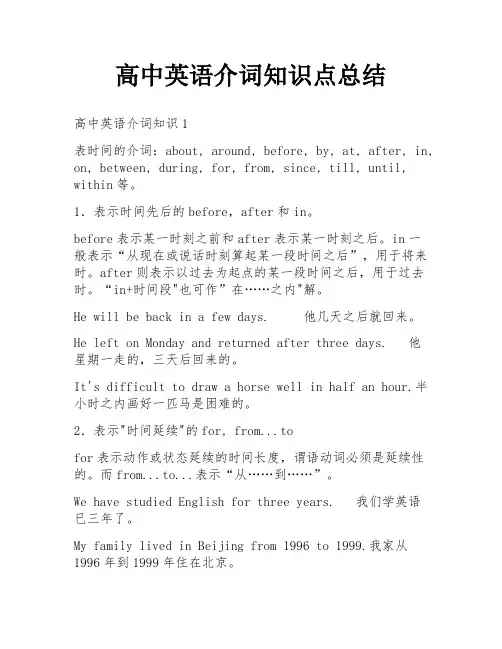
高中英语介词知识点总结高中英语介词知识1表时间的介词:about, around, before, by, at, after, in, on, between, during, for, from, since, till, until, within等。
1.表示时间先后的before,after和in。
before表示某一时刻之前和after表示某一时刻之后。
in一般表示“从现在或说话时刻算起某一段时间之后”,用于将来时。
after则表示以过去为起点的某一段时间之后,用于过去时。
“in+时间段"也可作”在……之内"解。
He will be back in a few days. 他几天之后就回来。
He left on Monday and returned after three days. 他星期一走的,三天后回来的。
It's difficult to draw a horse well in half an hour.半小时之内画好一匹马是困难的。
2.表示"时间延续"的for, from...tofor表示动作或状态延续的时间长度,谓语动词必须是延续性的。
而from...to...表示“从……到……”。
We have studied English for three years. 我们学英语已三年了。
My family lived in Beijing from 1996 to 1999.我家从1996年到1999年住在北京。
3.表示"时限"的介词since, from, by, until(till)since表示动作的起始点,其意是 "从……以来 ",常与完成时态连用。
from表示时间的起始点,其意是"从",常和一般过去时连用。
until(prep. & conj.)意为"直到……为止"。
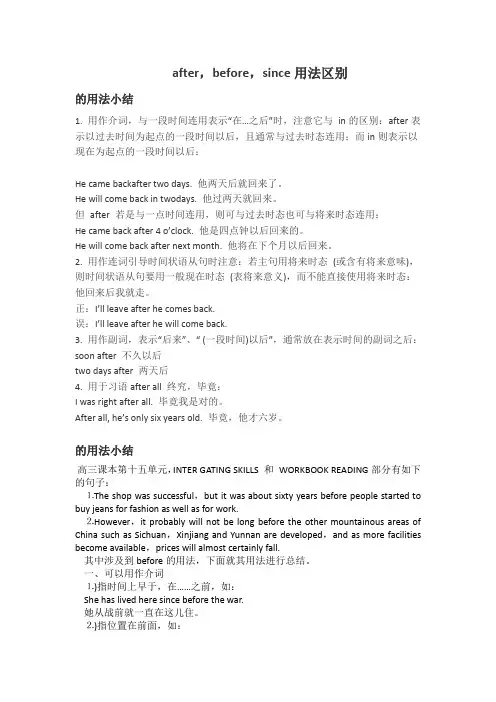
after,before,since用法区别的用法小结1. 用作介词,与一段时间连用表示“在…之后”时,注意它与in的区别:after表示以过去时间为起点的一段时间以后,且通常与过去时态连用;而in则表示以现在为起点的一段时间以后:He came backafter two days. 他两天后就回来了。
He will come back in twodays. 他过两天就回来。
但after 若是与一点时间连用,则可与过去时态也可与将来时态连用:He came back after 4 o’clock. 他是四点钟以后回来的。
He will come back after next month. 他将在下个月以后回来。
2. 用作连词引导时间状语从句时注意:若主句用将来时态(或含有将来意味),则时间状语从句要用一般现在时态(表将来意义),而不能直接使用将来时态:他回来后我就走。
正:I’ll leave after he comes back.误:I’ll leave after he will come back.3. 用作副词,表示“后来”、“ (一段时间)以后”,通常放在表示时间的副词之后:soon after 不久以后two days after 两天后4. 用于习语after all 终究,毕竟:I was right after all. 毕竟我是对的。
After all, he’s only six years old. 毕竟,他才六岁。
的用法小结高三课本第十五单元,INTER GATING SKILLS 和WORKBOOK READING部分有如下的句子:⒈The shop was successful,but it was about sixty years before people started to buy jeans for fashion as well as for work.⒉However,it probably will not be long before the other mountainous areas of China such as Sichuan,Xinjiang and Yunnan are developed,and as more facilities become available,prices will almost certainly fall.其中涉及到before的用法,下面就其用法进行总结。
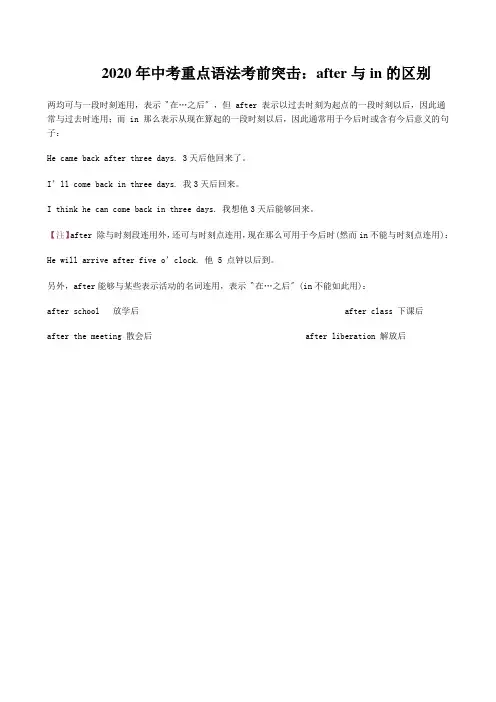
2020年中考重点语法考前突击:after与in的区别
两均可与一段时刻连用,表示〝在…之后〞,但 after 表示以过去时刻为起点的一段时刻以后,因此通常与过去时连用;而 in 那么表示从现在算起的一段时刻以后,因此通常用于今后时或含有今后意义的句子:
He came back after three days. 3天后他回来了。
I’ll come back in three days. 我3天后回来。
I think he can come back in three days. 我想他3天后能够回来。
【注】after 除与时刻段连用外,还可与时刻点连用,现在那么可用于今后时(然而in不能与时刻点连用):
He will arrive after five o’clock. 他 5 点钟以后到。
另外,after能够与某些表示活动的名词连用,表示〝在…之后〞(in不能如此用):
after school 放学后 after class 下课后
after the meeting 散会后 after liberation 解放后。
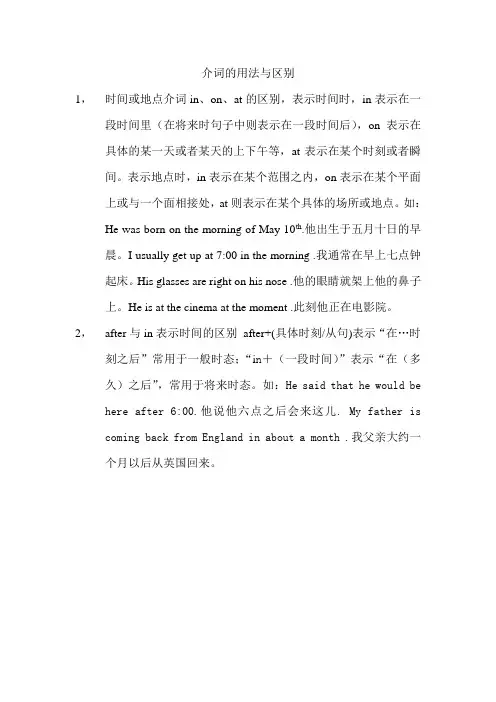
介词的用法与区别
1,时间或地点介词in、on、at的区别,表示时间时,in表示在一段时间里(在将来时句子中则表示在一段时间后),on表示在
具体的某一天或者某天的上下午等,at表示在某个时刻或者瞬
间。
表示地点时,in表示在某个范围之内,on表示在某个平面
上或与一个面相接处,at则表示在某个具体的场所或地点。
如:He was born on the morning of May 10th.他出生于五月十日的早
晨。
I usually get up at 7:00 in the morning .我通常在早上七点钟
起床。
His glasses are right on his nose .他的眼睛就架上他的鼻子
上。
He is at the cinema at the moment .此刻他正在电影院。
2,after与in表示时间的区别after+(具体时刻/从句)表示“在…时刻之后”常用于一般时态;“i n+(一段时间)”表示“在(多
久)之后”,常用于将来时态。
如:He said that he would be here after 6:00.他说他六点之后会来这儿. My father is coming back from England in about a month .我父亲大约一
个月以后从英国回来。
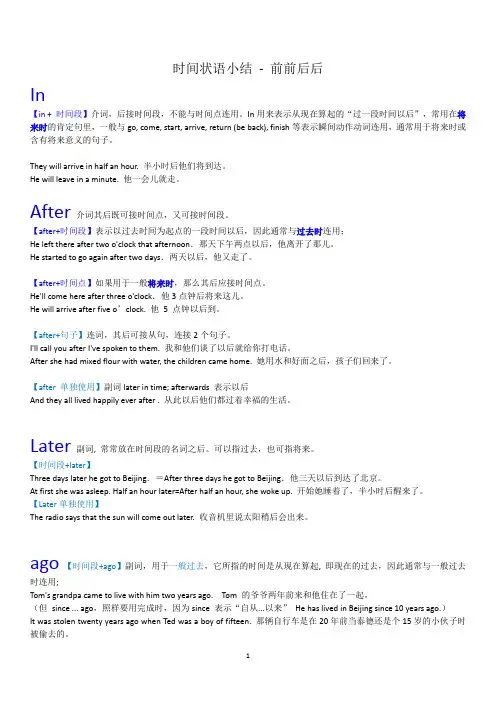
时间状语小结- 前前后后In【in + 时间段】介词,后接时间段,不能与时间点连用。
In用来表示从现在算起的“过一段时间以后”,常用在将来时的肯定句里,一般与go, come, start, arrive, return (be back), finish等表示瞬间动作动词连用,通常用于将来时或含有将来意义的句子。
They will arrive in half an hour. 半小时后他们将到达。
He will leave in a minute. 他一会儿就走。
After介词其后既可接时间点,又可接时间段。
【after+时间段】表示以过去时间为起点的一段时间以后,因此通常与过去时连用;He left there after two o'clock that afternoon.那天下午两点以后,他离开了那儿。
He started to go again after two days.两天以后,他又走了。
【after+时间点】如果用于一般将来时,那么其后应接时间点。
He'll come here after three o'clock.他3点钟后将来这儿。
He will arrive after five o’clock. 他5 点钟以后到。
【after+句子】连词,其后可接从句,连接2个句子。
I'll call you after I've spoken to them. 我和他们谈了以后就给你打电话。
After she had mixed flour with water, the children came home. 她用水和好面之后,孩子们回来了。
【after 单独使用】副词later in time; afterwards 表示以后And they all lived happily ever after . 从此以后他们都过着幸福的生活。
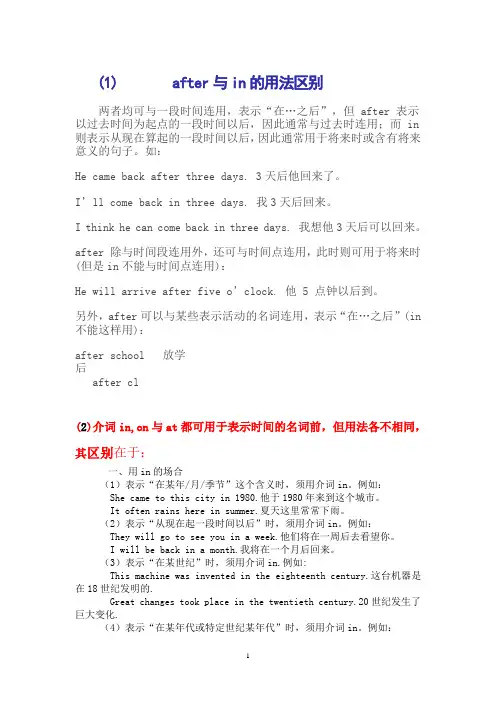
(1) after与in的用法区别两者均可与一段时间连用,表示“在…之后”,但 after 表示以过去时间为起点的一段时间以后,因此通常与过去时连用;而 in 则表示从现在算起的一段时间以后,因此通常用于将来时或含有将来意义的句子。
如:He came back after three days. 3天后他回来了。
I’ll come back in three days. 我3天后回来。
I think he can come back in three days. 我想他3天后可以回来。
after 除与时间段连用外,还可与时间点连用,此时则可用于将来时(但是in不能与时间点连用):He will arrive after five o’clock. 他 5 点钟以后到。
另外,after可以与某些表示活动的名词连用,表示“在…之后”(in 不能这样用):after school 放学后 after cl(2)介词in,on与at都可用于表示时间的名词前,但用法各不相同,其区别在于:一、用in的场合(1)表示“在某年/月/季节”这个含义时,须用介词in。
例如:She came to this city in 1980.他于1980年来到这个城市。
It often rains here in summer.夏天这里常常下雨。
(2)表示“从现在起一段时间以后”时,须用介词in。
例如:They will go to see you in a week.他们将在一周后去看望你。
I will be back in a month.我将在一个月后回来。
(3)表示“在某世纪”时,须用介词in.例如:This machine was invented in the eighteenth century.这台机器是在18世纪发明的.Great changes took place in the twentieth century.20世纪发生了巨大变化.(4)表示“在某年代或特定世纪某年代”时,须用介词in。
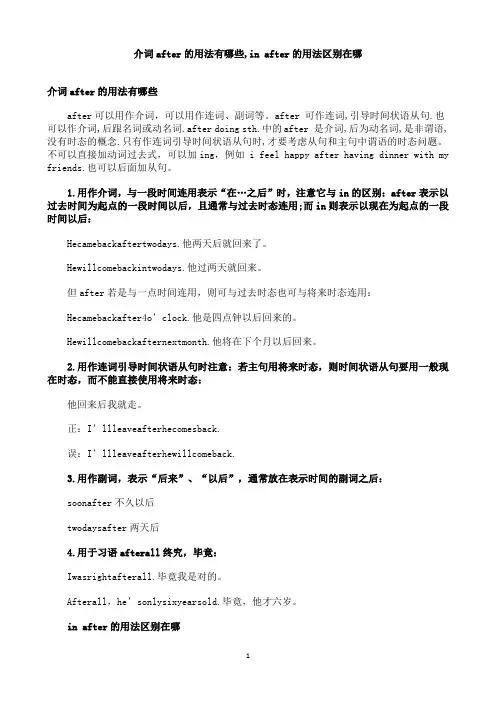
介词after的用法有哪些,in after的用法区别在哪介词after的用法有哪些after可以用作介词,可以用作连词、副词等。
after 可作连词,引导时间状语从句.也可以作介词,后跟名词或动名词.after doing sth.中的after 是介词,后为动名词,是非谓语,没有时态的概念.只有作连词引导时间状语从句时,才要考虑从句和主句中谓语的时态问题。
不可以直接加动词过去式,可以加ing,例如 i feel happy after having dinner with my friends.也可以后面加从句。
1.用作介词,与一段时间连用表示“在…之后”时,注意它与in的区别:after表示以过去时间为起点的一段时间以后,且通常与过去时态连用;而in则表示以现在为起点的一段时间以后:Hecamebackaftertwodays.他两天后就回来了。
Hewillcomebackintwodays.他过两天就回来。
但after若是与一点时间连用,则可与过去时态也可与将来时态连用:Hecamebackafter4o’clock.他是四点钟以后回来的。
Hewillcomebackafternextmonth.他将在下个月以后回来。
2.用作连词引导时间状语从句时注意:若主句用将来时态,则时间状语从句要用一般现在时态,而不能直接使用将来时态:他回来后我就走。
正:I’llleaveafterhecomesback.误:I’llleaveafterhewillcomeback.3.用作副词,表示“后来”、“以后”,通常放在表示时间的副词之后:soonafter不久以后twodaysafter两天后4.用于习语afterall终究,毕竟:Iwasrightafterall.毕竟我是对的。
Afterall,he’sonlysixyearsold.毕竟,他才六岁。
in after的用法区别在哪▲in 与after 均可表示“在……之后”,与一段时间连用时,after表示以过去时间为起点的一段时间以后,因此通常与过去时连用。
介词at, in, on;below与under;after与behind;after与in辨析一、介词at, in, on的区别1. 表示时间,注意以下用法:(1) 表示时间的某一点、某一时刻或年龄等用 at。
如:I get up at six in the morning. 我早上六点钟起床。
(2) 泛指一般意义的上午、下午或晚上以及月或年等较长的时间,一般用 in。
如:We watch TV in the evening. 我们晚上看电视。
(3)表示星期几或某一特定的日期,则用 on。
如:He left here on the fifth of May. 他于 5 月 5 日离开这儿。
2. 表示地点、场所、位置等,注意以下用法:(1) 表示某一点位置,用 at。
如:We live at No 87 Beijing Road. 我们住在北京路 87 号。
与名词所有格连用表示地点,也用 at。
如:at my sister’s 在我姐姐家at the doctor’s 在医务室(2) 表示空间或范围,用 in。
如:What’s in the box? 这盒子里有什么?He lives in Paris with his wife. 他同他妻子住在巴黎。
但有时两者可换用。
如:The meeting was held at [in] the hotel. 会议在宾馆举行。
(3) at 与 in 的另一个区别是:at 用于指较小的地方,而 in 用于指较大的地方。
如:in Shanghai 在上海 at the station 在车站但是,大与小是相对的,有时随着说话者的着眼点不同,大地方也可能用 at(比如把一个大地方看作一个点时)。
如:Our plane refuelled at London. 我们的飞机在伦敦加油。
(4) 介词 on 用于地点,主要指在某物的表面。
如:What’s on the table? 桌上有什么?There’s a wallet lying on the ground. 地上有个钱包。
介词in的用法总结你知道in的用法吗?快来一起学习吧,下面我就和大家共享,来观赏一下吧。
介词in 的用法总结1. 表示时间,表示“在……后”,留意它与after的区分:虽然两者均可与一段时间连用,表示多久之后,但in 以现在时间为起点,表示从现在起多久以后,通常用于将来时态或含有将来意味的句子;而after 则以过去或将来时间为起点,表示从那以后。
如:I’ll come back in five minutes.我5分钟后就回来。
(以现在时间为起点)He came back after five minutes.5分钟后他就回来了。
(以过去时间为起点)但是,若after后接的不是一“段”时间,而是一“点”时间,则完全可以现在时间为起点。
如:I’ll come back after five o’clock.我5点钟以后回来。
不过,在现代英语中,以上规章有时被打破。
如:I may come after a day or two.我可能过一两天会来。
Wang Bing is leaving the USA after two days.两天后王兵要离开美国。
2. 类似in three days 这样的短语,有时含义不易确定,由于它既可表示“3天内”,也可表示“3天后”,大致可以这样区分:若与连续性动词连用,则表示“3天内”,若与非连续性动词连用,则表示“3天后”。
如:He learnt English in three weeks.他在3周内学会了英语。
The train will arrive in a few minutes.火车过几分钟就到。
但语言的实际并不完全是这样,有时需视详细的上下文或语境来确定。
如:We should be able to complete the work in five days.我们应当能在5天内完成这工作。
为了明确语义,有时人们就分别用within 和after 来表示“在……内”和“在……后”:I’ll see you again within three days.3天内我再来看你。
in,after,later的用法区别in,after,later 都含有“在……以后”的意思,但它们在用法上有区别。
in与after 均可与一段时间连用,表示“在…之后”,但是: after 表示以过去时间为起点的一段时间以后,因此通常与一般过去时连用;after还可与时间点连用,此时则可用于一般将来时(但是in不能与时间点连用);而 in 则表示从现在算起的一段时间以后,因此通常用于一般将来时或含有将来意义的句子。
如:He came back after three days. 3天后他回来了。
He will arrive after five o’clock. 他 5 点钟以后到。
I’ll come back in three days. 我3天后回来。
later作副词,可以指过去,也可指将来,常常放在时间段的名词之后,也可单独用。
如:Three days later he got to Beijing.=After three days he got to Beijing.他三天以后到了北京。
At first she was asleep. Half an hour later/After half an hour she woke up. 开始她睡着了,半小时后醒来了。
The radio says that the sun will come out later.收音机里说太阳稍后会出来。
用in, after或later填空。
1.I shall go swimming ______ four o'clock this afternoon.2. They will return _________ two weeks.3. We shall come again _________.4. The meeting ended _________ an hour.5. He is going to London _________ three days.6. We started out ______ two weeks.A. inB. afterC. laterD. for7.Just____seven the rain began to fall.8.He went there a few days______.9.She will come to see us ________ .10.I shall come round _________a day or two.11.He then left home,and came back______ a year.参考答案:1. after2. in3. later4. after5. in6.B7.afterterter 10.in 11.after“以前”解,但是用法是有区别的:1、ago放在表示时间段的词语后,意思是“从现在算起的若干时间以前”,谓语动词常使用一般过去时。
(1) after与in的用法区别均可与一段时间连用,after 表示以过去时间为起点的一段时间以后,因此通常与过去时连用;而in则表示从现在算起的一段时间以后,因此通常用于将来时或含有将来意义的句子。
如:He came back after three days. 3天后他回来了。
I’ll come back in three days. 我3天后回来。
I think he can come back in three days. 我想他3天后可以回来。
after 除与时间段连用外,还可与时间点连用,此时则可用于将来时(但是in不能与时间点连用):He will arrive after five o’clock. 他 5 点钟以后到。
(2)介词in,on与at都可用于表示时间的名词前,但用法各不相同,其区别在于:一、用in的场合(1)表示“在某年/月/季节”这个含义时,须用介词in。
例如:She came to this city in 1980.他于1980年来到这个城市。
It often rains here in summer.夏天这里常常下雨。
(2)表示“从现在起一段时间以后”时,须用介词in。
例如:They will go to see you in a week.他们将在一周后去看望你。
I will be back in a month.我将在一个月后回来。
(3)表示“在某世纪”时,须用介词in.例如:This machine was invented in the eighteenth century.这台机器是在18世纪发明的.Great changes took place in the twentieth century.20世纪发生了巨大变化.(4)表示“在某年代或特定世纪某年代”时,须用介词in。
例如:This incident happened in the 1970''''s.该事件发生在20世纪70年代。
作者: 张奎金
出版物刊名: 齐鲁师范学院学报
页码: 61-65页
主题词: 谓语动词;用法;现在完成时;介词短语;时间状语;动名词;区别;终止性动词;表示;状语从句
摘要: 一、since 表示时间的用法since 在句中可以用作介词、连词和付词.有时在句中使用相似的 since 短语和从句,但它们表达的意义都大不相同,有的意义竟会相反。
因此需要注意since 在用法上的种种区别.Ⅰ.since 作介词时的用法和区别1、since 后跟名词或动名词构成介词短语,在句中作时间状语.谓语动词应该用现在完成时,而且应是表示延续意义的动词,不可为表示终止意义的动词.例如:。
(1) after与in的用法区别均可与一段时间连用,after 表示以过去时间为起点的一段时间以后,因此通常与过去时连用;而in则表示从现在算起的一段时间以后,因此通常用于将来时或含有将来意义的句子。
如:He came back after three days. 3天后他回来了。
I’ll come back in three days. 我3天后回来。
I think he can come back in three days. 我想他3天后可以回来。
after 除与时间段连用外,还可与时间点连用,此时则可用于将来时(但是in不能与时间点连用):He will arrive after five o’clock. 他 5 点钟以后到。
(2)介词in,on与at都可用于表示时间的名词前,但用法各不相同,其区别在于:一、用in的场合(1)表示“在某年/月/季节”这个含义时,须用介词in。
例如:She came to this city in 1980.他于1980年来到这个城市。
It often rains here in summer.夏天这里常常下雨。
(2)表示“从现在起一段时间以后”时,须用介词in。
例如:They will go to see you in a week.他们将在一周后去看望你。
I will be back in a month.我将在一个月后回来。
(3)表示“在某世纪”时,须用介词in.例如:This machine was invented in the eighteenth century.这台机器是在18世纪发明的.Great changes took place in the twentieth century.20世纪发生了巨大变化.(4)表示“在某年代或特定世纪某年代”时,须用介词in。
例如:This incident happened in the 1970''''s.该事件发生在20世纪70年代。
The Anti-Japanese War broke out in the 1930''''s.抗日战争爆发于20世纪30年代。
除此之外,morning / evening / afternoon 三个词也常跟介词in连用。
例如:Don't watch TV too much in the evening.晚上看电视不要太多。
They sometimes play games in the afternoon.他们有时在下午做游戏。
二、用on的场合(1)表示“在具体的某一天”或“(在具体的某一天的)早上、中午、晚上”等,须用介词on。
例如:Jack was born on May 10th,1982.杰克生于1982年5月10日。
They left on a rainy morning.他们是在一个雨天的早上离开的。
He went back to America on a summer afternoon.他于一个夏天的下午返回了美国。
(2)表示“在星期几”或“在星期几的早上、中午、晚上”等,须用介词on。
例如:We don't go to school on Saturday and Sunday.我们星期六和星期天不上学。
What time do you get up on weekdays?你在平日什么时候起床?I heard this story on Saturday morning.我是在星期六的早晨听到这个故事的。
(3)表示“在某一节日”时,须用介词on。
例如:We usually eat mooncakes on Mid-autumn Festival.我们通常在中秋节吃月饼。
Mr Hu received a card on Teachers''''Day.胡老师在教师节那天收到了一张卡片。
注意:当morning,evening,afternoon被of短语修饰,习惯上用in,而不用on.例如:in the early morning of September 10th 在9月10的清晨;in the late afternoon of September 12th 在9月12日的傍晚。
三、用at的场合(1)表示“某一具体时刻(即几点几分时)”,须用介词at。
例如:He gets up at six o''''clock every day .他每天六点起床。
I got home at five thirty yesterday afternoon.我昨天下午五点半到家。
(2)用在特定的时候(时节、时机)时,须用介词at。
例如:They were happy at that time.他们那时很幸福。
I think the shop is clcsed at this time of day.我认为商店在白天的这个时候关门了。
(3)表示“在中午、在夜晚、在周末”时,须用介词at。
例如:What do you often do at noon?你中午经常做些什么?You can see many stars in the sky at night.夜晚你能看到天空中有许多星星。
(4)表示“在……岁”时,须用介词at。
例如:At the age of nine ,the boy could swim well.在九岁的时候,这孩子就游泳游得很好了。
At the age of twenty,I began to teach English at this school.在二十岁的时候,我就开始在这所学校教英语了。
注意:在含有next ,last,this,one ,any, each, every , some, all 的词组和tomorrow,yesterday, the day after tomorrow, the day before yesterday 前不用任何介词。
例如:What did you do last summer holidays?去年暑假你做了些什么?What are you going to do the day after tomorrow?后天你打算做什么? 早、午、晚要用in,at黎明、午夜、点与分。
年、月、年月、季节、周,阳光、灯、影、衣、冒in。
将来时态in...以后,小处at大处in。
有形with无形by,语言、单位、材料in。
特征、方面与方式,心情成语惯用in。
介词at和to表方向,攻击、位置、恶、善分。
日子、日期、年月日,星期加上早、午、晚,收音、农场、值日on,关于、基础、靠、著论。
着、罢、出售、偷、公、假,故意、支付、相反,准。
特定时日和“一……就”,on后常接动名词。
年、月、日加早、午、晚,of之前on代in。
步行、驴、马、玩笑on,cab,carriage则用in。
at山脚、门口、在当前,速、温、日落、价、核心。
早、午、晚要用inin the evening 在晚上in the day 在白天例:in the afternoon 在下午in the morning 在早上at黎明、午、夜、点与分例at dawn at daybreak 在黎明时候at night 在夜间at noon 在中午at midnight 在午夜以上短语都不用冠词at nine o'clock 在9点钟at 8:30 seven thirty 在8点半at half past ten 在10点半at nine fifteen 在9点15分at ten thirty a.m. 在上午10点30分也可以写成seven to five 5点差7分半小时以上five minutes after two 2点过5分at the weekend 在周末at a quarter to two 1点45分年、月、年月、季节、周即在“来年”,在“某月”,在“某年某月” 但在某年某月某日则用on ,在四季,在第几周等都要用in。
例:in 1989 在1989年in 1927 在1927年in March 在三月in April 在四月in December 1986 在1986年12月in July l984 在1984年7月in the first week of this semester这学期的第一周in the third week 在第三周in spring 在春季in summer 在夏季in autumn 在秋季in winter 在冬季阳光、灯、影、衣、冒in即在阳光下,在灯下,在树阴下,穿衣、着装、冒雨等都要用in。
例:Don't write in dim light.切勿在暗淡的灯光下写字。
They are reviewing their lessons in thebright light.他们在明亮的灯光下复习功课。
They are playing in the shade of a tree.他们坐在树阴下玩耍。
a prisoner in irons 带着镣铐的囚犯He went in the rain to meet me at thestation. 他冒雨到车站去接我。
The poor in rags in old society. 旧社会穷人们衣衫褴褛.以及:in the bright sunlight 在明亮的阳光下a merchant in disguise 乔装的商人the woman in white black red yellow穿着白黑、红、黄色衣服的妇女in uniform 穿着制服in mourning 穿着丧服in red shoes 穿着红色鞋in his shirt sleeves 穿着衬衫将来时态in...以后例They will come back in 10 days.他们将10天以后回来。
I'll come round in a day or two.我一两天就回来。
We'll be back in no time.我们一会儿就回来。
Come and see me in three days' time.三天后来看我。
从现在开始after... 从过去开始小处at大处in例:Li and I arrived at Heishan county safe and sound all is well. Don't worry. 李和我平安地到达黑山县,一切很好,勿念。